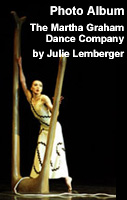




|
Go
back to Flash Reviews Flash APAP
Review P.S. By Paul Ben-Itzak
Now that I've got your attention: Forgot to mention a fundamental point which came out of the Women in the World, Women in Dance panel at APAP. Can't remember if this was actually raised directly by one of the panelists, or if I reached this conclusion based on what was said: Might have been related to this: To sort of encapsulate the whole situation, Ellis Wood gave the set-up in her family. Her mother trained as a dancer from age 3; her father started at 25. They both got into the Graham company. He became the rehearsal director; she became his demonstrator. When they retired from dancing, he got offers to direct five of the major modern dance companies in the world; she got no offers. They eventually started the dance department at the University of California at Berkeley. He was named director; she was made his assistant, at a salary less than half of his. From this and other facts, I came to this conclusion: The attitude of many in society towards women who dance is that it is not a job, but just a manifestation of being a woman: You're a woman, of course you dance. It's not a profession. But when a man does it, it is imbued with seriousness of labor and intention. This strikes a personal chord with me for two reasons. First, as a trained childcare worker, I remember being laughed at by a kibbutz coordinator, in 1980, when I said the job I wanted was to work with children. "That's for women," SHE said. I think one reason childcare jobs do not paying living wages is they are not really considered work, but just part of what women do, and not really a profession. There is also an archaic assumption that women are supported by husbands, and don't really need to make a living wage. Second, a couple of years ago I was hanging on a beach in Ocean City, Maryland, with a dancer I was dating. Some teenagers were playing catch, and their ball threatened to strike us. My friend told them to move. I, half-jokingly, warned, "Yeah, you'd better listen, she's a dancer and she might kick you." My remark was really a compliment to her strength. One of the boys responded, "Oh, do you dance in a strip club?" I was shocked by this, but my friend, who had heard it before, explained that outside of New York, this was the equation a lot of people made to the description dancer: it must mean dancer in a strip club. In other words, "dancer" was perceived not as a job, not as an artist, but as it related to serving men. The irony, of course, was that what I had learned from dating this dancer was that, if anything, dancing was not only a profession, but a 24/7 job at that. As a writer, my job is in my brain, and the condition of my body doesn't really matter that much. I can leave the job behind when I turn off this computer. I can pig out. I can get three hours of sleep. I can abuse my body. Not so for a dancer. I have had other smart people tell me, earnestly, that because dancing is a passion, that should be enough; its practitioners should not expect decent pay. Plus, there is a supposition that since you're a woman, you are supported by a husband, or will be, so you don't need decent pay. I have one more question to add to the list in Flash APAP, one that unfortunately, we must still ask in January 2000: When will it stop? When will society stop using the fact that dance is an art to excuse the indecent level of compensation? When will it stop using the fact that dance artists are doing something they love as an excuse to not pay them a salary they can live on? I had one more epiphany when dating my friend. Even as a senior dancer with a major, busy modern company, she made less in one year than a high-priced baseball pitcher makes for one inning of play. Folks, something's happening here, and it's gotta change. |